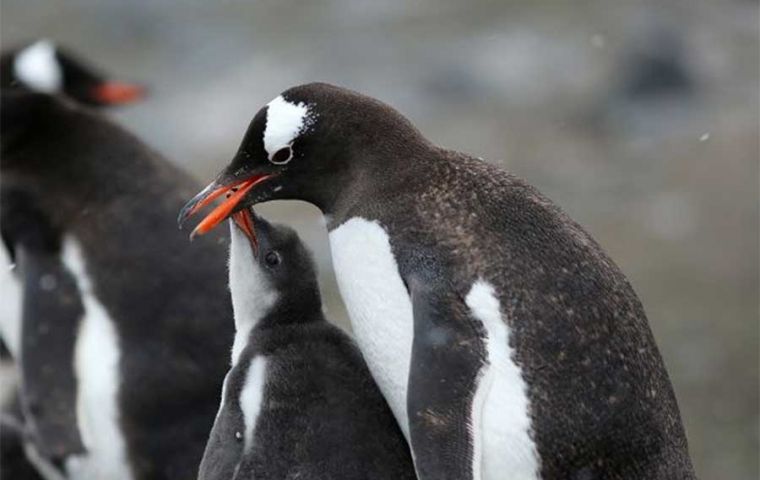MercoPress. South Atlantic News Agency
Gentoo penguins: Dive, forage, love? Fitter penguins dive deeper
 Thousands of gentoo penguins live and hunt, using the Falkland Islands as a breeding zone for their tiny chicks.
Thousands of gentoo penguins live and hunt, using the Falkland Islands as a breeding zone for their tiny chicks. Sarah McComb Turbitt, marine biologist from the University of British Columbia illustrates us with a new study published in Marine Ecology Progress Series, from Dr. Marie Auger-Méthé, principal investigator and associate professor at the University of British Columbia’s Department of Statistics and Institute for the Oceans and Fisheries (IOF). The article interesting enough refers Gentoo penguins in the Falkland Islands.
On the remote and rugged Falkland Islands in the South Atlantic, birdlife prospers. Native to the Islands, hundreds of thousands of gentoo penguins live and hunt, using the Islands as a breeding zone for their tiny chicks.
The birth dates, and chances for survival, of chicks depend on when their parents lay eggs — a factor reliant on the adults being able to forage and feed enough to have the energy to breed.
Now a new study in Marine Ecology Progress Series is investigating links between penguins’ diving efficiency, oxygen storage and aerobic capacities, pre-breeding foraging, and breeding statuses.
“We were interested in understanding how diving capacity — specifically how long gentoo penguins can stay at the bottom — is related to their aerobic condition,” said, principal investigator and associate professor at the University of British Columbia’s Department of Statistics and Institute for the Oceans and Fisheries (IOF).
“Diving deep takes time and energy, and it’s useful only if the penguin can search and catch food at the bottom. Our study indicated that penguins with higher aerobic capacities can spend more of their dive at depth than other penguins while still taking the same amount of time to recover.”
The researchers found that hemoglobin was positively correlated with diving efficiency, particularly for deeper dives, and only penguins with high levels frequently dove at depths beyond 140 meters.
Early-laying penguins spent also less time at sea prior to nesting than non-breeding penguins, suggesting the more efficient foragers lay earlier.
“Animals attempt to time the birth of new offspring with an abundance of food in their environment for optimal nourishment while the chicks grow,” said lead author and marine biologist Sarah McComb-Turbitt, who conducted the research as a masters’ student at UBC.
“Penguins can also lay later in the season, delaying nesting until they have recovered from the harsh winter seas. The trade-off, however, is that late chicks will be smaller when winter comes again and have a lower chance of survival. Chicks from eggs laid early have a longer period of growth before winter, increasing their chances of fledging and growing into adulthood.”
With larger prey found at the bottom, penguins that can dive deeper and longer have a better chance of feeding sufficiently. Hemoglobin—the protein in red blood cells that carries oxygen to all parts of the body—is a key factor. These penguins also don’t need to spend more time replenishing their oxygen stores, which means they can forage for food much more efficiently.
Surprisingly, hematocrit—the percentage of red blood cells in blood—didn’t correlate with stronger diving. Having more red blood cells thickens blood, creating lower circulation and making the heart work harder to circulate the blood.
“While most research still tries to describe what a typical individual of a species does, we know that individuals vary drastically in their conditions, behavior and reproduction,” said Dr. Auger-Méthé. “In some cases, there may not be a typical individual that represents the majority in a population. These differences can have a large effect on their resilience to human stressors, as some individuals may be hit harder than others.”
With gentoo penguins, those human stressors can include anything from climate change, fishing and tourism to pollution, invasive species and human development.
“Pollution from shipping, oil spills and other maritime activities introduce contaminants that penguins ingest and carry,” said McComb-Turbitt. “Overfishing could impact the food availability, and consequently, a penguin’s survival and ability to reproduce.”




Top Comments
Disclaimer & comment rules-

Read all commentsSeems like Mike Bingham's report on penguins is closer to the truth than maybe portrayed by some. Taking the first laying of the gentoo eggs on the islands saw massive increase in survival rate. This was believed to coincide with the later arrival of the main food that penguins eat. Fishing in the last 30 years has certainly had an effect on wildlife around the Falklands together with strict control of egg collection has seen penguins actually decline .
Nov 14th, 2023 - 11:24 am 0Likewise we have seen a huge decline in the inshore species of fish as fishing catches have reduced the feed supply for the seal populations, meaning they are now hunting closer to shore.
They are even now aggressively killing all varieties of penguins not just at sea but now on land. Something that was quite rare to see 30 Years ago.
But as usual this is all blamed on climate change.
Climate change has nothing to do with big fishing industries hoovering up every type of fish they can find. There are growing concerns of the wale populations now as big fishing companies are catching huge amounts of Krill for fertiliser.
If these areas of commercial business continue the way they are it wont be long untill there is a major depletion in all sea life.
Commenting for this story is now closed.
If you have a Facebook account, become a fan and comment on our Facebook Page!